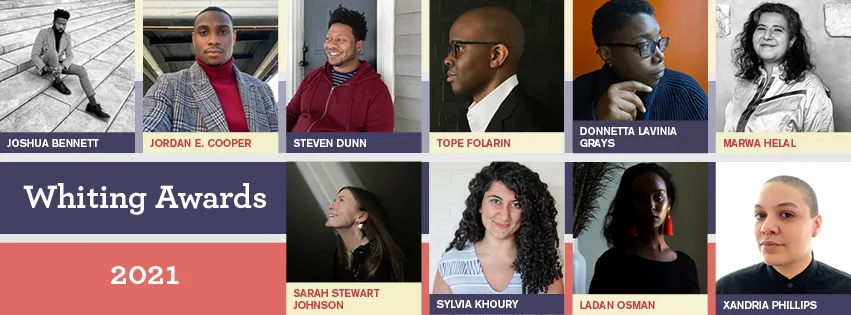
Meet the Winners of the 36th Annual Whiting Awards
Last night the Whiting Foundation announced the winners of its 36th annual awards. The winners were named in a virtual ceremony that included a keynote speech by U.S. Poet Laureate Tracy K. Smith. The winners were introduced by 2015 Whiting Award winner Elena Passarello, and each gave a brief reading.
The Whiting Awards, established in 1985, celebrate emerging writers. They recognize early career achievements and come with a $50,000 prize to help writers fulfill their literary promise. The prize money, one of the largest prizes given to emerging writers, is designed to allow the winners to devote themselves full-time to their writing and to encourage risk-taking and experimentation.
Prizes are awarded in the areas of fiction, nonfiction, poetry, and drama, with an emphasis on work that crosses genre boundaries. To date, 360 writers have won a total of $8.5 million to support their work.
Quotations below come from the 2021 Whiting Award judges. And now for the winners!

Fiction Winners
Steven Dunn, Potted Meat and water & power
Dunn’s “narratives about life in the military draw on his experience as a veteran to explore powerlessness, the discomforts of the body, the need to hide one’s sexuality, the desire to assert control — but finds strength in softness.”
Tope Folarin, A Particular Kind of Black Man
Folarin is “an engrossing storyteller, [who] crafts marvelous sentences that act as a clear pane of glass through which one glimpses an upside-down world.”
Nonfiction Winners
Joshua Bennett, Being Property Once Myself
Bennett’s “criticism radically expands ideas of what it is to be alive in the world, reshuffling hierarchies of knowledge and power and hinting at a new way of being.” The Whiting Foundation is also honoring Bennett for his poetry (The Sobbing School and Owed).
Sarah Stewart Johnson, The Sirens of Mars: Searching for Life on Another World
Johnson’s writing is “full of joy and existential curiosity…connecting scientific inquiry with deep questions about human existence.”
Poetry Winners
Marwa Helal, Invasive Species
Helal’s poems are “not only marvelously various in form, but emotionally epiphanic…layer[ing] natural, cultural, and even typographic landscapes.”
Ladan Osman, Exiles of Eden
Osman’s “dazzling and incisive poetry creates vibrant connections between generations of women, between the self and history, and between our bodies and the natural world.”
Xandria Phillips, Hull
Phillips’s poems “revel in brevity and lushness…[and] feel revolutionary: formally superb, but with a constant tilting of expectation in image and phrase.”
Drama Winners
Jordan E. Cooper, Black Boy Fly, Ain’t No Mo’, and Alice Wonder
Cooper’s work is “hilarious, bombastic, electric…plays celebrate spectacle and explode conventions, mixing the taboo with the silly, the profound with the profane.”
Donnetta Lavinia Grays, Where We Stand, Warriors Don’t Cry, and Last Night and the Night Before
Grays’s “portrayal of family — its complicated manifestations of love, its convoluted sense of responsibility — feels revelatory; we come to know her characters as deeply as anyone in our lives.”
Sylvia Khoury, Selling Kabul, The Place Women Go, and Against the Hillside
Khoury’s plays “focus on the U.S. presence in Afghanistan and Pakistan; evoking grand geopolitical drama through simple human gesture…break[ing] down barriers between human beings, revealing the powerful lines of connection that exist and persist.”
Courtney Hodell, Director of Literary Programs, says this about the winners: “In a year of singular difficulty, these writers accessed joy, honoring past voices in their own family histories, and in the culture. To a striking degree, they move fluidly across restrictive genre borderlines to create a vibrant picture of new writing in this country.”
Previous winners include Jericho Brown, Anne Boyer, Colson Whitehead, Mary Ruefle, Don Mee Choi, and many other writers who have gone on to distinguished literary careers. A complete list of winners is available here. You can find more information on the Whiting Foundation website and on Twitter and Facebook.
Catch up on other recent literary prize announcements here.


